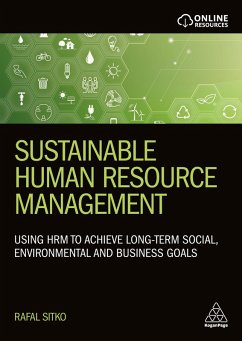
Assessing, Managing and Remediating Business' Impacts on Human Rights: A Guide for Sustainable Entrepreneurs (eBook, ePUB)

PAYBACK Punkte
0 °P sammeln!
Recognized international human rights have traditionally been framed as creating duties and obligations for states under treaties and other instruments and elements of international human rights law and relatively little attention, if any, has been paid to businesses' responsibility for human rights. Many clung to the argument that states had the exclusive responsibility when it came to human rights and that the role of businesses should be confined to complying with the laws and regulations promulgated by states with respect to workplace conduct, use of natural resources, and the like. Howeve...
Recognized international human rights have traditionally been framed as creating duties and obligations for states under treaties and other instruments and elements of international human rights law and relatively little attention, if any, has been paid to businesses' responsibility for human rights. Many clung to the argument that states had the exclusive responsibility when it came to human rights and that the role of businesses should be confined to complying with the laws and regulations promulgated by states with respect to workplace conduct, use of natural resources, and the like. However, the day-to-day operational activities and strategic decisions of businesses inevitably have an impact, both positive and negative, on one or more universally recognized human rights, and there is a growing consensus that businesses have a duty to respect human rights, and governmental and intergovernmental bodies have attempted to establish guidelines that could serve as point of reference for the duties and responsibilities of businesses as they conduct their business activities. The most well-known of these initiatives is the UN Guiding Principles on Business and Human Rights (endorsed by the Human Rights Council in 2011). Governments have also been involved in multi-stakeholder initiatives to develop sector-specific guidance for human rights due diligence and have acted through various types of domestic legislation.
This book relies on the Guiding Principles to develop and explain a framework that sustainable entrepreneurs can use to effectively fulfill their emerging responsibilities to their stakeholders and society in general relating to respect for universally recognized human rights. The book covers assessment, management and remediation of business' impacts on human rights and includes chapters on the evolving relationship of business and human rights; international human rights law, the Guiding Principles and other related standards developed by intergovernmental bodies; human rights policies and commitments; assessment of human rights impacts; integration and actions; measurement and tracking; communications and reporting; remediation; governance and management; engagement; rights at work: human rights and labor practices; responsible supply chain management; businesses' impacts on human rights; discrimination and protection of vulnerable groups; and human rights considerations in common business transactions.
This book relies on the Guiding Principles to develop and explain a framework that sustainable entrepreneurs can use to effectively fulfill their emerging responsibilities to their stakeholders and society in general relating to respect for universally recognized human rights. The book covers assessment, management and remediation of business' impacts on human rights and includes chapters on the evolving relationship of business and human rights; international human rights law, the Guiding Principles and other related standards developed by intergovernmental bodies; human rights policies and commitments; assessment of human rights impacts; integration and actions; measurement and tracking; communications and reporting; remediation; governance and management; engagement; rights at work: human rights and labor practices; responsible supply chain management; businesses' impacts on human rights; discrimination and protection of vulnerable groups; and human rights considerations in common business transactions.
Dieser Download kann aus rechtlichen Gründen nur mit Rechnungsadresse in A, B, CY, CZ, D, DK, EW, E, FIN, F, GR, H, IRL, I, LT, L, LR, M, NL, PL, P, R, S, SLO, SK ausgeliefert werden.













